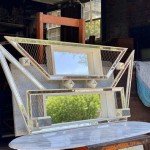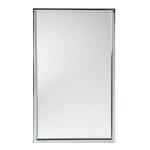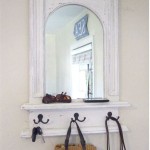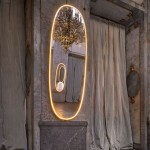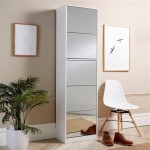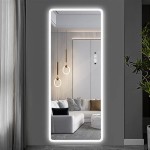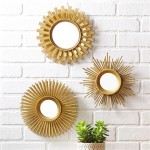Rounded Corner Mirrors: Aesthetics, Functionality, and Applications
Rounded corner mirrors are a contemporary design element gaining significant popularity in interior design. These mirrors, characterized by their softened edges, offer a departure from the traditional sharpness of rectangular or square mirrors, providing a softer, more organic aesthetic. Their versatility allows them to integrate seamlessly into various architectural styles, enhancing both the functionality and visual appeal of diverse spaces.
The allure of rounded corner mirrors lies in their ability to blend seamlessly with existing décor. The absence of sharp angles creates a sense of visual harmony, preventing the mirror from appearing harsh or imposing. This subtle detail can significantly impact the overall ambiance of a room, contributing to a more welcoming and relaxed atmosphere. Because they are less jarring to the eye than sharp-edged counterparts, they are visually appealing and can improve the serenity of a space. Beyond aesthetics, rounded corner mirrors also offer practical advantages, particularly in environments where safety is a concern.
Enhanced Safety Features
One of the primary advantages of rounded corner mirrors is the reduced risk of injury. Sharp corners can pose a hazard, especially in high-traffic areas or spaces frequented by children. The rounded edges eliminate this risk, making these mirrors a safer option for bathrooms, hallways, and children’s rooms. This is a particularly pertinent consideration in environments prioritizing safety without compromising style. The gradual curve of the edge provides a softer surface should accidental contact occur, minimizing the potential for cuts or abrasions.
Furthermore, the use of rounded corner mirrors can contribute to a more inclusive design. Individuals with visual impairments or mobility challenges may find navigating spaces with sharp corners more difficult. The rounded edges provide a tactile cue, allowing individuals to better perceive the boundaries of the mirror and avoid potential collisions. This consideration highlights the importance of incorporating safety measures into interior design, particularly in public spaces or environments designed to be accessible to all.
The construction process of rounded corner mirrors also contributes to their safety. Many manufacturers utilize specialized techniques to ensure that the edges are smooth and free from imperfections. This meticulous attention to detail further minimizes the risk of injury, ensuring that the mirror is both aesthetically pleasing and functionally safe. The bevelling or polishing of the rounded edges is a common practice that not only enhances the visual appeal but also provides an additional layer of protection.
Versatile Design Applications
Rounded corner mirrors are incredibly versatile and can be incorporated into a wide range of design schemes. They are equally at home in minimalist, modern, and traditional interiors, seamlessly adapting to the existing aesthetic. This adaptability stems from their simple yet elegant design, which allows them to complement a variety of materials, colors, and textures. Whether used as a focal point in a living room or as a functional element in a bathroom, rounded corner mirrors can enhance the overall design of a space.
In bathrooms, rounded corner mirrors are often used above vanities, providing a soft and flattering reflection. The rounded edges complement the curves of sinks and other bathroom fixtures, creating a cohesive and harmonious design. The mirrors can be framed or frameless, depending on the desired aesthetic. Frameless designs offer a minimalist look, while framed mirrors can add a touch of sophistication and elegance. The choice of frame material and finish can further customize the mirror to match the overall bathroom décor.
Living rooms benefit from the addition of rounded corner mirrors, which can be used to create a sense of spaciousness and light. Placing a large rounded corner mirror on a wall can visually expand the room, making it feel larger and more open. The mirror also reflects natural light, brightening the space and creating a more inviting atmosphere. Strategically positioned mirrors can also highlight architectural features or artwork, adding depth and interest to the room. The choice of size and placement is crucial in maximizing the impact of the mirror on the overall design.
Hallways can also benefit from the addition of rounded corner mirrors, which can help to brighten and widen these often narrow spaces. A rounded corner mirror placed at the end of a hallway can create the illusion of greater length, making the space feel less cramped and more inviting. The mirror can also serve as a functional element, allowing individuals to check their appearance before leaving the house. The design of the mirror should complement the overall style of the hallway, creating a seamless transition between spaces.
In bedrooms, rounded corner mirrors can be used as dressing mirrors or accent pieces. A full-length rounded corner mirror can provide a stylish and functional dressing area, while smaller mirrors can be used to decorate walls or create a focal point above a dresser. The soft curves of the mirror can add a touch of elegance and sophistication to the bedroom, creating a relaxing and inviting atmosphere. The choice of frame material and finish should complement the overall style of the bedroom, creating a cohesive and harmonious design.
Variations in Style and Construction
Rounded corner mirrors are available in a wide range of styles and constructions, allowing consumers to choose the perfect mirror to suit their individual needs and preferences. The variations in style include framed and frameless designs, as well as a variety of frame materials and finishes. The construction of the mirror can also vary, with options for different thicknesses of glass, as well as different methods of securing the mirror to the wall.
Frameless rounded corner mirrors offer a minimalist and contemporary look. These mirrors are typically constructed from a single piece of glass, with the edges polished to a smooth finish. The absence of a frame allows the mirror to blend seamlessly with the surrounding décor, creating a clean and uncluttered look. Frameless mirrors are often attached to the wall using adhesive or mounting clips, providing a secure and stable installation.
Framed rounded corner mirrors offer a more traditional and decorative look. The frame can be made from a variety of materials, including wood, metal, and plastic. The choice of frame material and finish can significantly impact the overall aesthetic of the mirror. Wooden frames can add warmth and character to a space, while metal frames can provide a more modern and industrial look. Plastic frames are often more affordable and can be easily customized to match the existing décor.
The thickness of the glass used in rounded corner mirrors can also vary. Thicker glass is generally more durable and resistant to breakage, making it a better choice for high-traffic areas or environments where safety is a concern. Thinner glass is often more affordable and can be used in less demanding applications. The choice of glass thickness should be based on the specific needs and requirements of the application.
The method of securing the mirror to the wall can also vary. Adhesive is a common method for attaching frameless mirrors, providing a clean and seamless look. Mounting clips are another option, offering a more secure and adjustable installation. Screws and anchors can also be used to secure framed mirrors to the wall, providing a strong and stable attachment. The choice of mounting method should be based on the weight and size of the mirror, as well as the type of wall on which it will be mounted.
Beyond the standard variations, custom rounded corner mirrors are also available. These mirrors can be tailored to specific dimensions, shapes, and finishes, allowing consumers to create a truly unique and personalized design. Custom mirrors are often used in high-end residential and commercial projects, where a specific aesthetic is required. The customization options can include the shape of the rounded corners, the type of glass used, and the design of the frame. Working with a reputable mirror manufacturer is essential to ensure that the custom mirror meets the desired specifications and is of the highest quality.

Edge Black Rounded Rectangle Mirror Reviews Crate Barrel

24 X 36 Rectangular Decorative Mirror With Rounded Corners Threshold Designed Studio Mcgee Target

Metal Framed Rounded Rectangle Mirror Better Bevel Made In Usa

Alta Black Minimal Rounded Rectangle Mirror 396 00

30 X 24 Rectangular Decorative Wall Mirror With Rounded Corners Brass Project 62 Target

Better Bevel 24 In X 36 Metal Framed Rounded Rectangle Bathroom Vanity Mirror Silver 20014 The Home Depot

24 X 36 Rectangular Decorative Mirror With Rounded Corners Brass Threshold Designed Studio Mcgee Target

Metal Framed Round Corner Wall Mirror 16x24

Frameless Beveled Rounded Rectangle Mirror Better Bevel

Modern Walnut Mirror Rounded Corners Deep Wooden Ready To Ship
